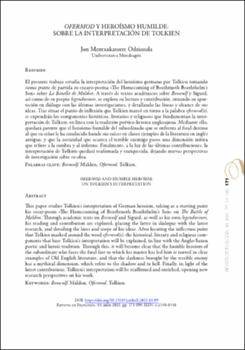Ofermod y heroísmo humilde: sobre la interpretación de Tolkien
Author
Mentxakatorre Odriozola, JonDate
2021Abstract
El presente trabajo estudia la interpretación del heroísmo germano por Tolkien tomando
como punto de partida su ensayo-poema «The Homecoming of Beorhtnoth Beorhthelm’s
Son» sobre La Batalla de Maldon. A través de textos académicos sobre Beowulf y Sigurd,
así como de su propio legendarium, se explora su lectura y contribución, situando su aportación en diálogo con las últimas investigaciones, y detallando las líneas y alcance de sus
ideas. Tras situar el punto de inflexión que Tolkien marcó en torno a la palabra ofermod(e),
se expondrán los componentes históricos, literarios y religiosos que fundamentan la interpretación de Tolkien, en línea con la tradición poético-heroica anglosajona. Mediante ello,
quedará patente que el heroísmo humilde del subordinado que se enfrenta al fatal destino
al que su señor le ha conducido hunde sus raíces en claros ejemplos de la literatura en inglés
antiguo, y que la oscuridad que acarrea el terrible enemigo posee una dimensión mítica
que refiere a la sombra y al infierno. Finalmente, a la luz de las últimas contribuciones, la
interpretación de Tolkien quedará reafirmada y enriquecida, dejando nuevas perspectivas
de investigación sobre su obra. This paper studies Tolkien’s interpretation of German heroism, taking as a starting point
his essay-poem «The Homecoming of Beorhtnoth Beorhthelm’s Son» on The Battle of
Maldon. Through academic texts on Beowulf and Sigurd, as well as his own legendarium,
his reading and contribution are explored, placing the latter in dialogue with the latest
research, and detailing the lines and scope of his ideas. After locating the inflection point
that Tolkien marked around the word ofermod(e), the historical, literary and religious components that base Tolkien’s interpretation will be explained, in line with the Anglo-Saxon
poetic and heroic tradition. Through this, it will become clear that the humble heroism of
the subordinate who faces the fatal fate to which his master has led him is rooted in clear
examples of Old English literature, and that the darkness brought by the terrible enemy
has a mythical dimension, which refers to the shadow and to hell. Finally, in light of the
latest contributions, Tolkien’s interpretation will be reaffirmed and enriched, opening new
research perspectives on his work.





